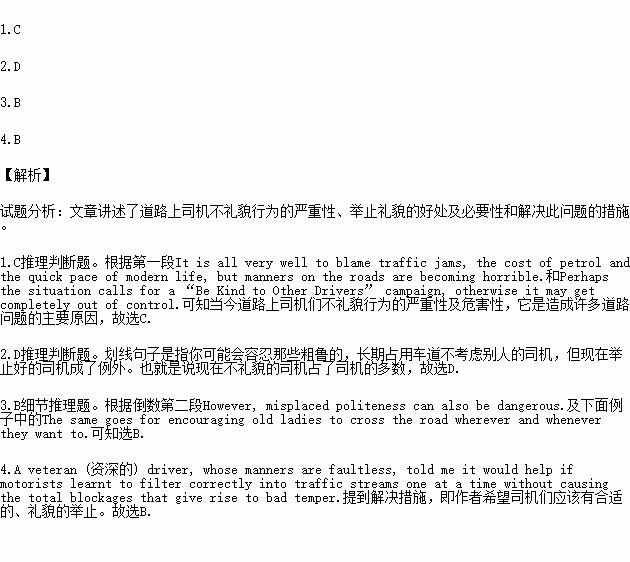题目内容
It is all very well to blame traffic jams, the cost of petrol and the quick pace of modern life, but manners on the roads are becoming horrible. Everybody knows that the nicest men become monsters behind the wheel. It is very well, again, to have a tiger in the tank, but to have one in the driver’s seat is another matter altogether. You might tolerate the odd road-hog, the rude and inconsiderate driver, but nowadays the well-mannered motorist is the exception to the rule. Perhaps the situation calls for a “Be Kind to Other Drivers” campaign, otherwise it may get completely out of control.
Road politeness is not only good manners, but good sense too. It takes the most cool-headed and good-tempered drivers to resist the temptation to revenge when subjected to uncivilized behavior. On the other hand, a little politeness goes a long way towards relieving the tensions of motoring. A friendly nod or a wave of acknowledgement in response to an act of politeness helps to create an atmosphere of goodwill and tolerance so necessary in modern traffic conditions. But such acknowledgements of politeness are all too rare today. Many drivers nowadays don’t even seem able to recognize politeness when they see it.
However, misplaced politeness can also be dangerous. Typical examples are the driver who brakes violently to allow a car to emerge from a side street at some hazard to following traffic, when a few seconds later the road would be clear anyway; or the man who waves a child across a zebra crossing into the path of oncoming vehicles that may be unable to stop in time. The same goes for encouraging old ladies to cross the road wherever and whenever they want to. It always amazes me that the highways are not covered with the dead bodies of these grannies.
A veteran (资深的) driver, whose manners are faultless, told me it would help if motorists learnt to filter correctly into traffic streams one at a time without causing the total blockages that give rise to bad temper. Unfortunately, modern motorists can’t even learn to drive, let alone master the subtler aspects of boatmanship. Years ago the experts warned us that the car-ownership explosion would demand a lot more give-and-take from all road users. It is high time for all of us to take this message to heart.
1.According to this passage, troubles on the road are primarily caused by ________.
A. people’s attitude towards the road-hog
B. the rhythm of modern life
C. the behavior of the driver
D. traffic conditions
2.The sentence “You might tolerate the odd road-hog... the rule.” (Para. 1) implies that ________.
A our society is unjust towards well-mannered motorists
B. rude drivers can be met only occasionally
C. the well-mannered motorist cannot tolerate the road-hog
D. nowadays impolite drivers make up the majority of motorists
3.In the writer’s opinion, which is “misplaced politeness”?
A. Revenge when subjected to uncivilized behavior.
B. Encouraging old ladies to cross the road as long as they want to.
C. A wave of acknowledgement in response to an act of politeness.
D. Waving a child across a zebra crossing.
4.In the writer’s opinion, ________.
A. strict traffic regulations are badly needed
B. drivers should apply road politeness properly
C. rude drivers should be punished
D. drivers should avoid traffic jams

